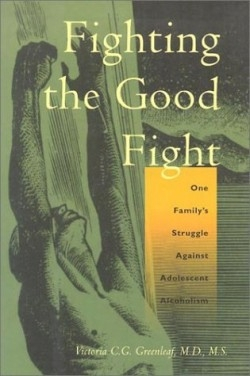Fighting the Good Fight
One Family?s Struggle against Adolescent Alcoholism
“Some assert that a mindset of optimism in itself tips the scale toward a positive outcome, and the negative of the converse. This is not my experience.” This contrarian admission understandably follows from the author’s struggle to identify the cause of her teen-aged son’s stalled development. When both his grades and his geniality slide toward the gutter during high school, Greenleaf musters all of her skills to figure out why. With the discovery of empty bottles and cans behind the drywall in the son’s basement bedroom, the diagnosis of alcoholism rises to the top of the list of equally devastating possible conditions like schizophrenia and anti-social personality disorder.
This memoir opens with the author and her husband seeing their third son, David, off at the airport. The destination, though unnamed, represents another chance for this young adult to succeed despite his string of failed attempts. The outcome, Greenleaf notes, is up to her son—it is “all in those incompetent hands.” From that ominous beginning the reader is lead through the scenes that chronicle the onset and progression of the disease and the attempts to treat it. With meticulous detail, the author describes her son’s behavior, that of the medical and educational communities, and her own. She rails with a mother’s rage against the alcoholic’s denial and aloofness. Likewise, she lambastes the minimization and well-meaning enabling of family, friends, and institutions. While the story ends on a hopeful note, the author continues with her criticism of contemporary culture and her hopes and fears for the future.
Greenleaf, a psychiatrist, author, and poet, previously published A Handful of Ashes, an account of her travails raising her emotionally disturbed first-born son. The tragic fact of having two afflicted children adds relevance to her argument that in parenting, genetics, culture, and the home environment all weigh heavily in any equation that leads to a healthy, happy outcome. She notes that through her experience with her first son, she developed the habit of recording her “minutes” of significant meetings and events, which greatly facilitated her writing of her first book. That this habit has stuck with her is testimony to the rigor of Greenleaf’s approach to problem solving. As a scientist she surmounts obstacles through intellect and will—not through acceptance, passivity, or grace. Even her book’s title is anything but passive.
It is Greenleaf’s probing, questioning, challenging approach to adolescent alcoholism that distinguishes this volume from other memoirs. As such, it will complement the more instructional volumes for parents and family members seeking to understand and help the addicted adolescent.
Disclosure: This article is not an endorsement, but a review. The publisher of this book provided free copies of the book to have their book reviewed by a professional reviewer. No fee was paid by the publisher for this review. Foreword Reviews only recommends books that we love. Foreword Magazine, Inc. is disclosing this in accordance with the Federal Trade Commission’s 16 CFR, Part 255.

